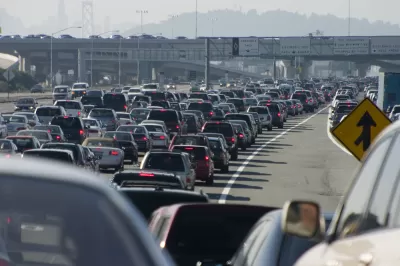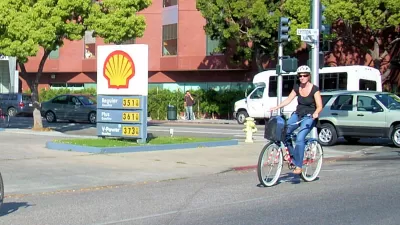The transportation research group, TRIP, tallied costs from additional crashes, higher operating costs, and congestion that result from insufficient investment in California's roads and bridges. A new effort was launched to increase state funding.

Insufficient investment in California's road system is by no means a new revelation. Gov. Jerry Brown announced his priority to tackle "the enormous $59 billion problem of deferred highway and bridge maintenance" in his 2015 joint inauguration and state of the state address.
A year later, the deficit had swelled to $77 billion. And it didn't help that California's gas tax decreased by 2.2 cents per gallon on July 1, the third consecutive year the Board of Equalization voted to reduce the tax. In the face of falling gas tax revenues, the California Transportation Commission announced on Jan. 22 that it would slash spending by $754 million on current projects over five years.
The 24-page report [PDF], released Aug. 17 on the state of California's road and bridges by TRIP (formerly The Road Information Program), a private, nonprofit national transportation research group based in Washington, D.C., is helpful in that it quantifies some of the costs that motorists pay when infrastructure investment falls way behind. In the Bay Area and Southern California, costs to motorists averaged over $2,800 annually.
"Roads and bridges that are deficient, congested or lack desirable safety features cost California motorists a total of $53.6 billion statewide annually," reports Rocky Moretti, Director of Policy and Research for TRIP.
The TRIP report finds that 37 percent of major locally and state-maintained roads are in poor condition. One quarter of California’s bridges are structurally deficient or functionally obsolete.
The group breaks out costs into three areas:
- Higher vehicle operating costs,
- Traffic crashes
- Congestion-related delays.
The report details costs for five regions, which have their own press releases:
- Los Angeles-Long Beach-Santa Ana urban area
- Sacramento area
- San Diego area
- San Francisco-Oakland urban area
- San Jose urban area
New legislation will tackle infrastructure deficit
To address these costs, the chairs of the Assembly and Senate Transportation Committees announced plans on Aug. 17 to increase transportation funding by hiking fuel taxes to raise $7.4 billion.
"The plan, highlighted by an increase of 17 cents per gallon in the gas tax, comes from Assemblyman Jim Frazier (D-Oakley, Contra Costa County) and Sen. Jim Beall (D-San Jose) in an attempt to unify the disparate proposals the pair had previously introduced in their respective houses," reported Liam Dillon for the Los Angeles Times on Aug. 17. In addition, the proposal, which has yet to be introduced as a bill, includes:
- A diesel tax increase of 30 cents per gallon, also indexed to inflation
- $165 annual fee for zero-emission vehicles
As of Aug. 9, California's gas tax of 38.57 cents per gallon [per API (PDF)] is the fifth highest in the nation after Pennsylvania, Washington, New York and Hawaii.
Hat tip to AASHTO Journal.
FULL STORY: Deficient, Congested Roadways Cost California Drivers $53.6 Billion Annually

Planetizen Federal Action Tracker
A weekly monitor of how Trump’s orders and actions are impacting planners and planning in America.

Congressman Proposes Bill to Rename DC Metro “Trump Train”
The Make Autorail Great Again Act would withhold federal funding to the system until the Washington Metropolitan Area Transit Authority (WMATA), rebrands as the Washington Metropolitan Authority for Greater Access (WMAGA).

DARTSpace Platform Streamlines Dallas TOD Application Process
The Dallas transit agency hopes a shorter permitting timeline will boost transit-oriented development around rail stations.

San Francisco's School District Spent $105M To Build Affordable Housing for Teachers — And That's Just the Beginning
SFUSD joins a growing list of school districts using their land holdings to address housing affordability challenges faced by their own employees.

Car-Centric LA Suburb Looks to a Train-Oriented Future
City leaders in Rancho Cucamonga, the future western terminus of the Brightline West rail line to Las Vegas, want to reimagine the city as a transit-oriented, pedestrian-friendly community.

New Alaska Bitcoin Mine Would Burn as Much Energy as the State’s Largest Coal Plant
Fueled by “stranded” natural gas, the startup hopes to become the largest in the US, and to make Alaska an industry center.
Urban Design for Planners 1: Software Tools
This six-course series explores essential urban design concepts using open source software and equips planners with the tools they need to participate fully in the urban design process.
Planning for Universal Design
Learn the tools for implementing Universal Design in planning regulations.
Municipality of Princeton
Roanoke Valley-Alleghany Regional Commission
City of Mt Shasta
City of Camden Redevelopment Agency
City of Astoria
Transportation Research & Education Center (TREC) at Portland State University
US High Speed Rail Association
City of Camden Redevelopment Agency
Municipality of Princeton (NJ)





























